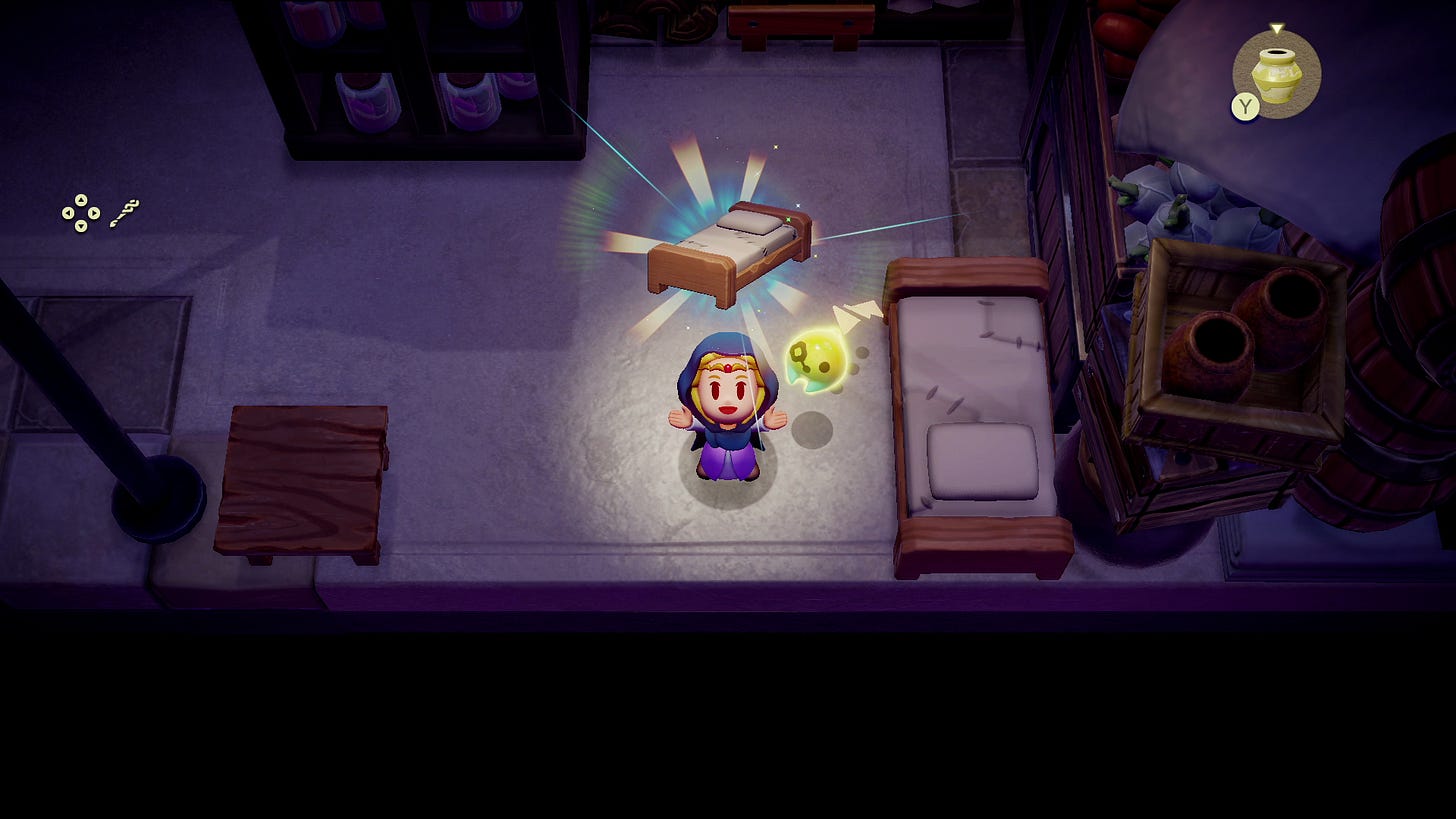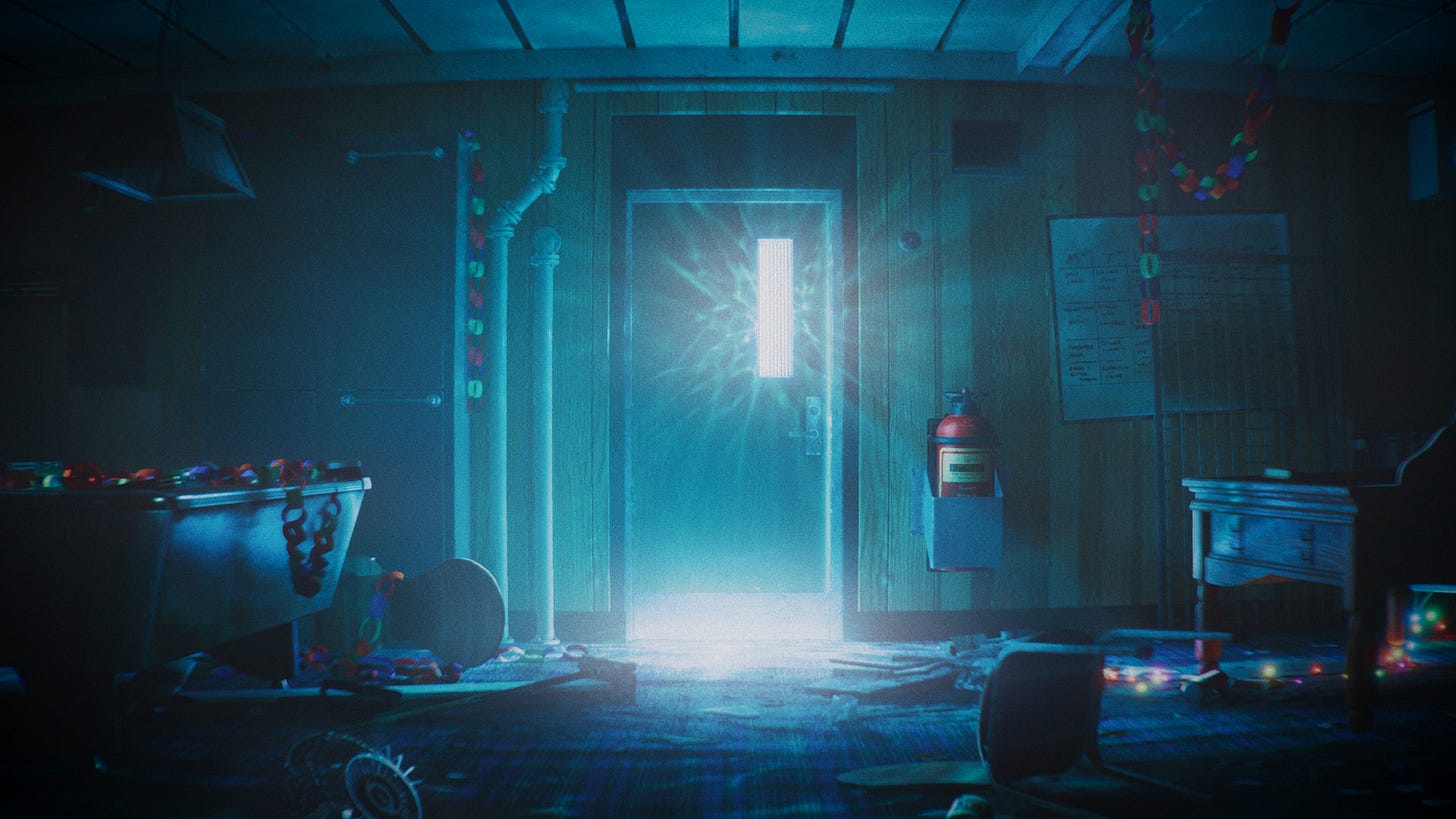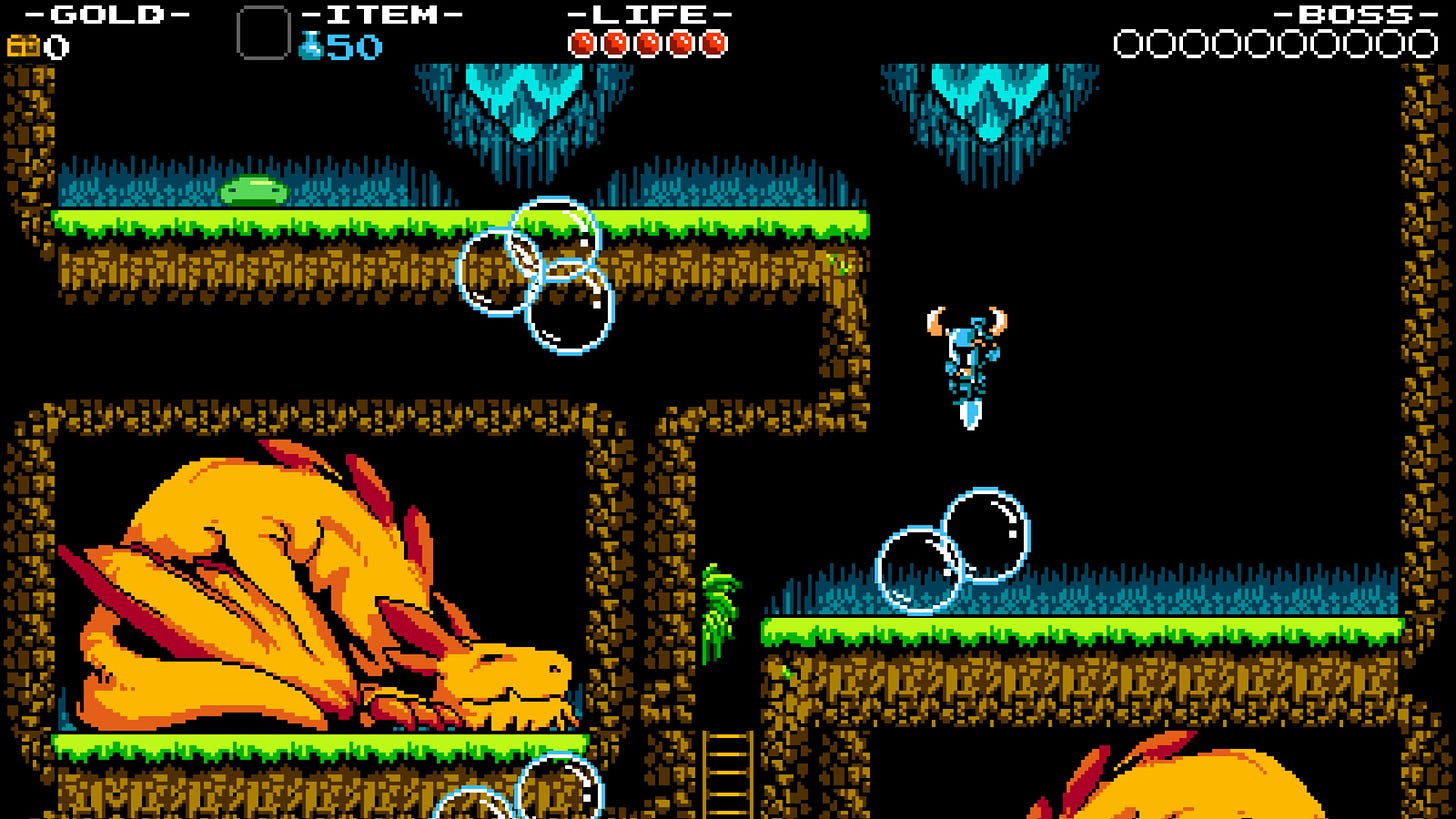Hello there! Did you have “new Zelda game with a playable Zelda” on your Nintendo Direct bingo cards? Because I sure didn’t. This week we’re running through the “final year” theme of Ninty’s latest broadcast, as well as checking out all the games new to the subs, revisiting Crime Boss: Rockay City, celebrating Shovel Knight on the occasion of his 10th anniversary and finishing up our series on Sega’s early 2000s.
A big thanks once again goes to guest writer Jam for filling in with their excellent takes! Alice will return after some much-deserved time off with her wife and new baby.
At last you can play as Zelda … as she makes a bed
By Tim
When a Nintendo platform is not long for this world, the riders of the apocalypse tend to be remasters from previous consoles, low-stakes spinoffs and Kirby. And while the pink puffball din’t appear in this morning’s Nintendo Direct, it’s clear the writing is on the wall for Switch, which as a fan of remasters and low-stakes spinoffs is incredible news for me personally.
Nintendo has proven its mastery of the full remake with the likes of Thousand Year Door, but it’s also very competent when it comes to polished HD re-releases like Metroid Prime. And it looks like we’re getting more of the latter for the final Switch push with Luigi’s Mansion 2 and Donkey Kong Country Returns. Does anyone need a Switch version of DKCR? Not especially, but it’s a great game and I’ll absolutely take it over having to deal with the Wii in 2024.
In spin-off land this year we’re getting a new Mario & Luigi RPG which looks like it’s in full 3D now, another Super Mario Party, plus a Legend of Zelda in the style of Grezzo’s Link’s Awakening remake, except it’s a new game where you play as Zelda and more or less have Link’s Autobuild ability from Tears of the Kingdom?! I can see some people being miffed that we’re finally getting a playable Zelda and she’s essentially in non-combat mode, but I also think it looks weird and rad.
Metroid Prime 4 was the big reveal here, which is not a spinoff or a re-release, meaning it’s absolutely coming as a launch title for the Switch’s successor next year. Those are the rules.
Elsewhere the Direct was furnished with some strong third-party support, which is also not uncommon in the dying days of a (strong) Nintendo platform. My personal picks are the remake of Dragon Quest III, which I’ve never played but is looking gorgeous, and the Marvel vs Capcom collection which means I can give my Saturn and Dreamcast a break when I’m craving a Ryu / Wolverine team-up, which is often.
What to play
Launching on Xbox Game Pass this week is Still Wakes the Deep, a horror survival tale from The Chinese Room (Dear Esther, Everybody’s Gone to the Rapture). It’s set on an oil rig, which is already the most phobia-dense location you could come up with, but when the undersea drill hits something that really should be left alone the crew on board begin transforming. It’s a tense and occasionally gross good time, but I ended up appreciating the walking simulator aspects a lot more than the horror. It’s the 70s, everyone is very Scottish, the protagonist is on the run from the law at the risk of abandoning his young family. The writing is top notch. Also this week Game Pass gets 2023 slow life sim My Time at Sandrock.
The PlayStation Plus Extra catalogue gets a few nice additions this week with Monster Hunter Rise, Football Manager 2024, Crusader Kings III, Ano 1800, a couple of old LEGO games and more. Shout out to After Us, a recent platformer that I enjoyed despite the heavy-handed ecological narrative, which is well worth a look if you’re a PS Plus subscriber. For those on the pricey Deluxe tier, you also get the PS2’s Ghosthunter and the PSP’s Daxter. Why not! And this is apparently where Sony has decided PS VR2 games will go, as Kayak VR: Mirage has been added to Deluxe as well.
Free right now on the Epic store is Redout 2, which is pretty much as close to an HD F-Zero as we’re going to get.
Rockay redemption
By Jam
I think a lot about the ‘fire and forget’ nature of how we publish reviews.
It’s a problem that extends beyond video games of course. No art exists in an immaculate, static vacuum, and how we feel about a movie, book, painting etc. can dramatically change over time.
Modern video games just happen to have the unique problem of *themselves* tending to change over time.
Patches, add-ons, bug-fixes, balance adjustments… Even your average ‘offline’ single-player game will often have become significantly transformed several months after launch. Given that most critics are tasked with getting their review done ahead of launch so that it can be published upon release, it can end up feeling like something of a disservice is being done to both the game and the audience after that launch period is over.
I reviewed the criminal empire roguelike Crime Boss: Rockay City last year, and while I stand by every word in the context of when it was published, the fact of the matter is that the game is *vastly* different now. It’s become an enormously better experience to play on every level, so much so that it has easily become one of my favorites in recent years.
It’s hitting Steam this week after being an Epic store exclusive on PC for the past year, and is doing so at a reduced price and with all its paid DLC bundled in for free for a limited time too. I was fortunate enough to have been given a code for the Steam version and I’ve been having an absolute ball with it over the past two weeks.
Of course anyone interested in picking it up on Steam is just going to see my middling review of it along with those of everyone else.
Is that fair? I don’t know. I don’t really have a solution here, but it is something I think about often.
Happy birthday Shovel Knight
by Tim
Shovel Knight didn’t begin the indie retro revival, but in 2014 it arguably represented the highest point of the movement. Pulling from a cavalcade of 8-bit sources, it mined the classics of the 80s and 90s not for nostalgia but for inspiration.
At the time of release I wrote that Shovel Knight’s soundtrack, characters, pixel art and game design were inarguably fresh and innovative, despite their deliberate retro aesthetic, which to me at the time felt radical and revelatory.
Now, incredibly, the game has spawned a franchise that’s remained strong and relevant for 10 years. And it hasn’t done so with free-to-play mechanics, marketing or psychology. It’s done it with reliably excellent craft and astonishing generosity. As the game was joined by three other full-sized adventures, those who bought the original were essentially gifted them for free. Spectre of Torment was my second favourite Switch launch game, and King of Cards was in close contention for my personal game of the year in 2019, so giving them away was no small thing.
Yacht Club has been generous in licensing its hero out to other indies for use in other games, to the point where he’s possibly been a bit too ubiquitous, but when it comes to Shovel Knight games the leash is much tighter. The falling block Puzzle Dungeon and roguelike Shovel Knight Dig are both excellent collaborations with other indies, and have also been furnished with multiple free updates. (All of the games are currently half price if you’re yet to play them!)
When I tuned into Yacht Club’s 10th anniversary broadcast last week and heard the original Shovel Knight was being made, I didn’t know what to think. What could they possibly add? But Shovel of Hope DX looks like another example of the team going above and beyond, keeping the original presentation but adding 20 playable characters, two player co-op, stackable cheats and a lot more.
It even teased a 3D Shovel Knight for the future. And while that idea could go so incredibly wrong, I’m gleefully optimistic. This team has earned that trust.
Retro Esoterica
by Tim
Sega’s early 2000s - part 3
2002 With the Dreamcast officially discontinued, many in-development games moved over to other consoles, and in particular Sega came out in support of the Xbox. This year saw wild shooter Gunvalkyrie, skating sequel Jet Set Radio Future, rail dragon rider Panzer Dragoon Orta and Sega GT 2002 release as exclusives for Microsoft’s new platform. Shenmue 2 was also introduced to America on the Xbox.
For Gamecube Sega ported beloved Dreamcast RPG Skies of Arcadia, and published Super Monkey Ball 2, a console-only sequel to the arcade hit. It rebooted some of its cult favourite franchises with Shining Soul on GBA, and Shinobi on PS2. Space Channel 5 Part 2, which gave a very poorly timed starring role to Michael Jackson as Space Michael, came to PS2 but also released on Dreamcast. And of course Sonic continued his move over to Nintendo audiences with Sonic Advance 2, plus a massive trove of 16- and 8-bit titles for Gamecube via the Sonic Mega Collection.
2003 I believe this is the first year since it entered the home gaming business that Sega did not publish a game for a first-party system, truly ending an era. For Gamecube, Sonic Team developed the underrated 3D platformer Billy Hatcher and the Giant Egg, while Amusement Vision created F-Zero GX thanks to a collaboration between Sega, Nintendo and Namco. On GBA, 2003 saw the incredible Astro Boy: Omega Factor from Sega and Treasure, original games Shining Shoul II and Sonic Pinball Party, plus portable versions of Crazy Taxi, Space Channel 5 and Jet Set Radio.
Elsewhere the PS2 got new games from the Virtual-on, Initial D and Shinobi franchises (with Nightshade), as well as the beginning of a series called Sega Ages 2500 which aimed to bundle classic games and/or remakes on PS2 discs for ¥2500 (around $25) a pop. The first year includes full remakes of Phantasy Star and Golden Axe, which blows my mind considering these versions weren’t made available outside of Japan and the PS2. Sonic-wise, all consoles got a port of the original Sonic Adventure, as well as the brand new Sonic Heroes, the first major console game in the series not to release on Sega Hardware.








